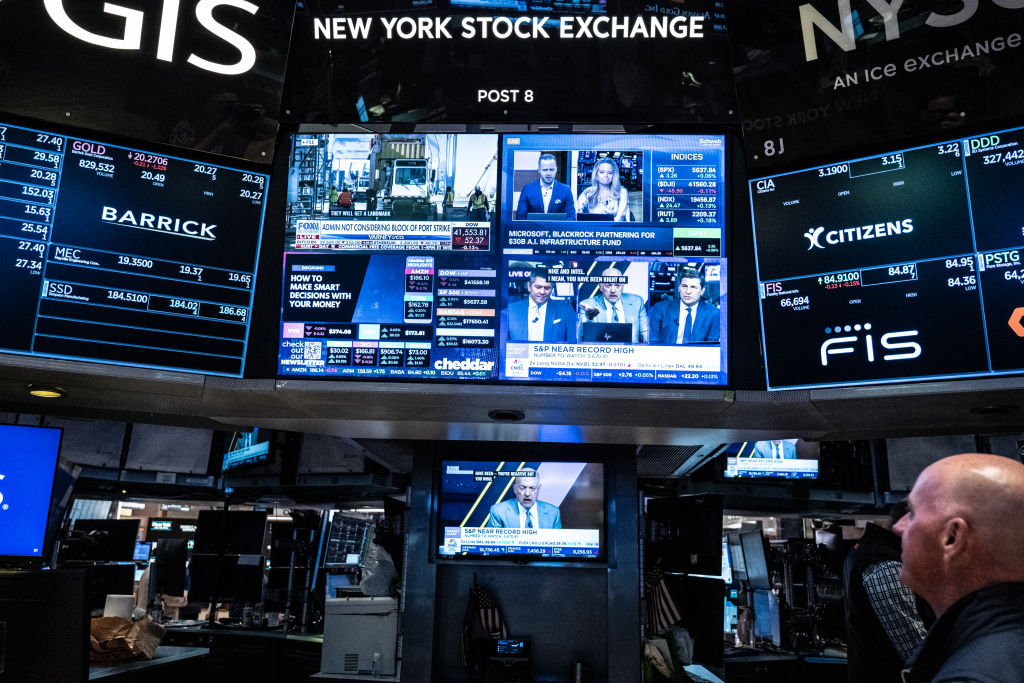For the first time since the onset of the coronavirus pandemic, the Federal Reserve has cut interest rates. It was not a tepid 25-basis-point reduction that many economists and market watchers had expected heading into the September Federal Open Market Committee (FOMC) meeting. Instead, it was a jumbo half-point cut to the benchmark federal funds rate. Put simply, a new era has begun at the Eccles Building.
Federal Reserve Goes Big
The US central bank marked the start of a new easing campaign by firing off a half-point cut to the 23-year high policy rate, dropping it to a range of 4.75% and 5.25%. The Summary of Economic Projections (SEP), a survey of where monetary policymakers think interest rates and other economic data points are headed, showed more rate cuts are ahead.
According to the SEP, officials anticipate the median policy rate will finish the year at 4.4%, down from the June projection of 5.1%. This indicates that the Fed plans to pull the trigger on 50 basis points worth of cuts by the end of 2024. Additionally, interest rates are projected to tumble to 3.4% in 2025 and 2.9% in 2026, down from the previous forecast of 4.1% and 3.1%, respectively.
As for the broader economy, the real GDP growth is expected to stall at 0% over the next three years. The unemployment rate is anticipated to hover around 4.4%, and the Fed’s preferred inflation gauges – the personal consumption expenditure (PCE) price index and core PCE, which excludes the volatile energy and food components, are predicted to slow to the 2% target by 2026.
Only one individual dissented from the decision: Fed Gov. Michelle Bowman. She preferred a quarter-point decrease in the policy rate.
The post-meeting FOMC statement said:
“Recent indicators suggest that economic activity has continued to expand at a solid pace. Job gains have slowed, and the unemployment rate has moved up but remains low. Inflation has made further progress toward the Committee’s 2 percent objective but remains somewhat elevated.
“The Committee seeks to achieve maximum employment and inflation at the rate of 2 percent over the longer run. The Committee has gained greater confidence that inflation is moving sustainably toward 2 percent, and judges that the risks to achieving its employment and inflation goals are roughly in balance. The economic outlook is uncertain, and the Committee is attentive to the risks to both sides of its dual mandate.”
Mission Accomplished?
Does this mean the Federal Reserve can declare “mission accomplished” now that the institution is embarking upon a campaign to lower interest rates? Fed Chair Jerome Powell refrained from popping open a bottle of champagne and dancing the Charleston.

(Photo by Stephanie Keith/Getty Images)
“We’re certainly not saying mission accomplished or anything like that, I have to say, though we’re encouraged by the progress that we have made,” Powell said, adding that there is “no rush” to bring interest down as quickly as possible. “We’re trying to achieve a situation where we restore price stability without the kind of painful increase in unemployment that has come sometimes with disinflation.”
Despite the outsized rate cut, Powell told reporters at the post-meeting press conference that this is not the start of the central bank’s new pace. “We can go quicker or slower, or pause, on rate cuts if it is appropriate,” Powell stated. Additionally, the Fed chief noted that the US economy is not poised to return to the time of ultra-low interest rates where bonds were negative yielding.
In the end, according to Powell, “the US economy is in good shape.”
Wall Street did not know how to take the news. After the blue-chip Dow Jones Industrial Average initially rocketed nearly 400 points following the Fed announcement, the index gave up its gains. It turned negative to finish the Sept. 18 trading session. The tech-heavy Nasdaq Composite Index and the S&P 500 both fell 0.25%. In the bond market, short-term US Treasury yields tanked, but medium- and long-term debt securities surged. The US Dollar Index (DXY), a gauge of the buck against a basket of currencies, eliminated its losses and rose from 0.16% to above the 101.00 threshold.
The US Election
President Joe Biden, who pressed the central bank to start cutting rates in December, celebrated the news, writing on the social media platform X: “We just reached an important moment: Inflation and interest rates are falling while the economy remains strong.” Many would expect this move by the Fed to bolster Vice President Kamala Harris’ chances at the polls, yet the head of the US central bank downplayed the rate cut’s impacts on the November election.
Powell, who has repeatedly stressed the Fed’s independence, told reporters that “the things that we do really affect economic conditions for the most part with a lag.” He alluded to the conventional view of monetary policy operating with a long and variable lag, something that Liberty Nation News has observed.
Former President Donald Trump has previously stated that the Federal Reserve should not cut interest rates before voters go to the polls, telling Bloomberg this past spring that it is “something that they know they shouldn’t be doing.” Households might not witness the cumulative effects of falling interest rates until next summer as the lower federal funds rate travels through the wider economy.
In the end, the United States is now at the start of a new era that borrows from the past: the injection of cheap money that will benefit those closest to the printing press, mainly politicians and Wall Street.




